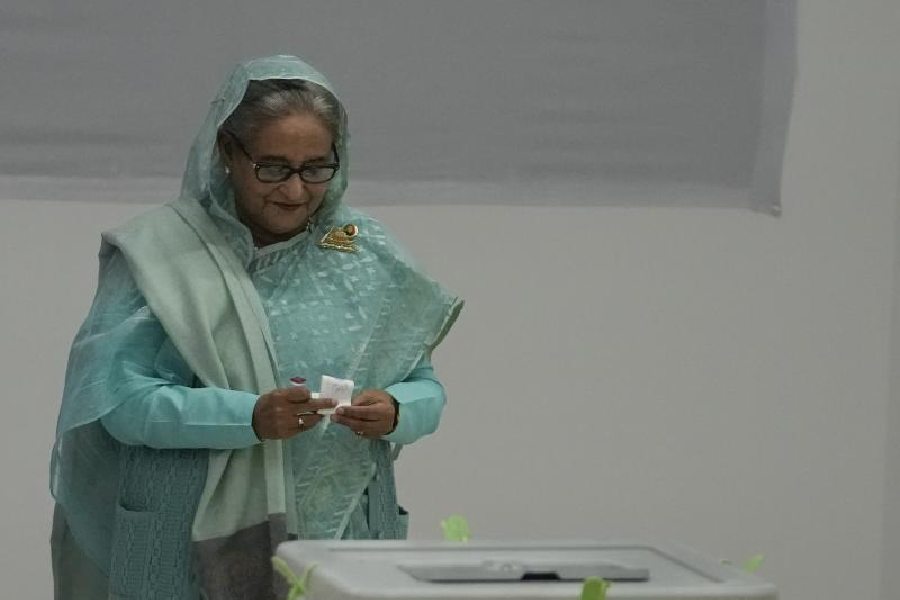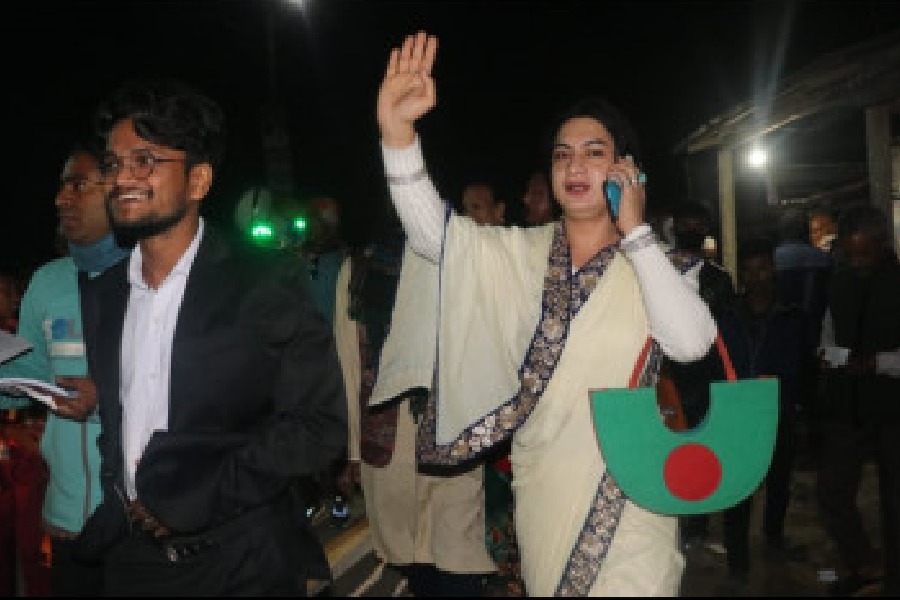Bangladeshis began voting on Sunday in the general elections, which is likely to be won by Prime Minister Sheikh Hasina for a fourth straight term, amid pre-poll violence and a boycott by the main opposition party BNP and its allies.
The voter turnout in many polling centres was low in the first two hours after polls opened at 8:00 am (local time). The voting will continue till 4 pm.
"I think the voter turnout will not be less than 50 per cent by the end of the day. The environment is peaceful across the country," Bangladesh Election Commissioner Anisur Rahman said.
A total of 119.6 million registered voters are eligible to vote at Sunday's polls in more than 42,000 polling stations, according to the country’s Election Commission.
The voting is being held in 299 out of the 300 constituencies. The election to one seat will be held later due to the death of a candidate.
More than 1,500 candidates from 27 political parties are contesting in the election, besides 436 independent candidates.
Over 100 foreign observers, including three from India, will monitor the 12th general election, which is being held under tight security.
More than 7.5 lakh members of law enforcement agencies and security forces have been deployed to ensure law and order during the polls.
The election commission said that it expected the results to start flowing from early on January 8.
Prime Minister Hasina cast her vote at Dhaka City College polling centre soon after the voting started. Her daughter Saima Wazed accompanied her.
Hasina, 76, has been in power since 2009 and her Awami League won the last election in December 2018. She is set to secure a fourth consecutive term as prime minister and a fifth overall term in the one-sided election.
"Polling in the country is going on very well. I hope all the people will come to vote and establish their rights. Maintain the democratic flow in the country and work for the socio-economic development of people," Hasina told reporters after casting her vote.
She alleged that the opposition Bangladesh Nationalist Party (BNP)-Jamaat-e-Islami alliance does not believe in democracy. "People will vote as they wish. And we were able to create that voting environment. Although the BNP-Jamaat alliance has caused many incidents including arson attacks," she said.
In response to a question, Hasina told reporters that India is a “trusted friend” of Bangladesh.
'We are very lucky...India is our trusted friend. During our Liberation War, they supported us not only that after 1975, when we lost our whole family - father, mother, brothers, everyone (in a military coup) - and only we two (Hasina and her younger sister Rehana) survived... they gave us shelter. So, we have our best wishes to the people of India," she told reporters.
In August 1975, Sheikh Mujibur Rahman, his wife and their three sons were assassinated in their home by military officers. His daughters Hasina and Rehana survived the purge as they were abroad.
In response to a question on how acceptable the election will be while the BNP is boycotting it, Hasina said that her responsibility is towards the people.
"Whether people accept this election or not it is important to me. So, I don't care about their (foreign media) acceptance. No matter what did the terrorist party say or not?" she said.
Prime Minister Hasina's ruling Awami League (AL) is expected to win for a straight fourth time as the BNP of former premier Khaleda Zia, 78, who is under house arrest as a convict of graft charges, boycotted the polls.
The BNP boycotted the 2014 election but joined the one in 2018.
The 27 political parties that are contesting the elections include the opposition Jatiya Party (JAPA). The rest are members of the ruling Awami League-led coalition, which experts dub as "satellite parties."
The BNP is observing a 48-hour nationwide general strike which began at 6 am on Saturday and will end at 6 am on Monday. It has called upon voters to shun the election to mark the beginning of an end of what it calls a "fascist government."
As part of its boycott campaign, the BNP has been calling countrywide general strikes. It has enforced intermittent transport blockades and strikes for the past three months. The party has been claiming no election under the incumbent government would be fair and credible.
BNP spokesman Ruhul Kabir Rizvi said the strikes were aimed at pressing for their demands for "resignation of the illegal government, establishment of a non-party neutral government and release of all party leaders and activists from prison".
Ahead of the elections, Hasina's government arrested tens of thousands of rival politicians and supporters, a move which rights groups have condemned as an attempt to paralyse the Opposition.
Fifteen other political parties are also boycotting the election that is being watched globally.
The boycott as well as fear of violence can keep a large number of voters away from voting.
"What's the point of going to the polling centres when the election is nothing but a battle between two groups of the same party? We all know Awami League will win the race at the end of the day," The Daily Star newspaper quoted Md Monir Hassan, a resident of Dhanmondi, as saying.
Monir also fears violence.
On Saturday, at least 14 polling stations in Bangladesh were set on fire, including one on the outskirts of the capital, Dhaka.
On Friday night, at least four people were killed and many others injured as arsonists set a running train on fire in Dhaka. Overall, nine people have lost their lives in eight incidents of arson on trains since November 16.
Additionally, at least five people have been killed in clashes and attacks on rival rallies since the official start of the election campaigns on December 18.
The ruling party has done everything it could to make the election look participatory and competitive. It allowed party leaders to join the polls in droves as "independent" candidates. As a result, in every seat, two or more AL candidates are pitted against each other.
The AL also formed dedicated teams across the country to bring as many voters as possible to the polling centres to ensure high turnout in efforts to garner international support.
"I will ask them (people) to come (and vote) as it is a beautiful day. It is a winter morning, and everybody is excited and eagerly waiting (to cast their votes)," said Bangladesh actor and Awami League leader Firdous Ahmed.
Former Election Commissioner Brig Gen (retd) Sakhawat Hussain termed Sunday's polls a unique one compared to the previous two elections.
"This time the election is taking place between candidates from the same party in the name of independents and dummies. As a result, voters are less interested in the polls," said Sakhawat.
He also said some parties that joined the race are not well-known, while some are facing existential crisis.
"So, it is a unique model election … Results of the election are certain, everybody knows who is going to win. The only uncertain thing is who will be in the opposition bench," he added.
Except for the headline, this story has not been edited by The Telegraph Online staff and has been published from a syndicated feed.












